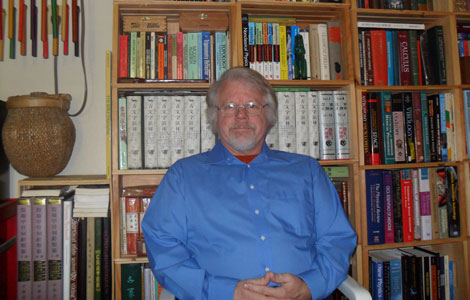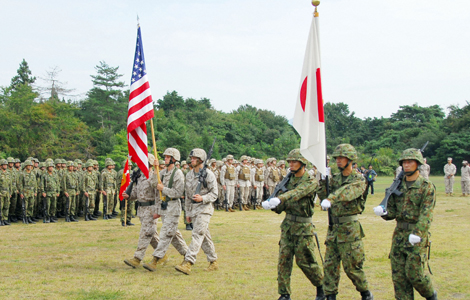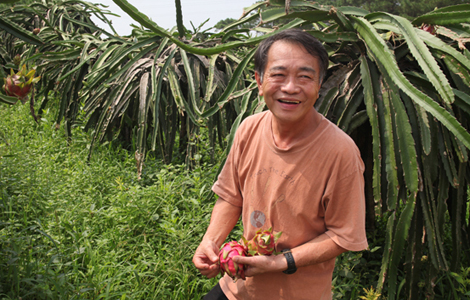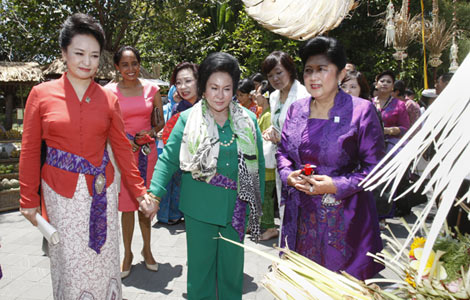A day of Chinese cultural exchange at Pace University
Updated: 2013-10-09 09:48
By Amy He in New York (China Daily)
|
||||||||
China's Nanjing Normal University joined the Confucius Institute at Pace University in Manhattan to host a day of cultural exchange that celebrated the partnership and friendship between the two institutions.
Earlier Tuesday morning, the two universities signed a memorandum of agreement to foster further academic cooperation, said Uday Sukhatme, provost of Pace University.
"It's an official recognition of friendship between the two universities," Sukhatme said. "Of course we knew that already because the university joined to put forth the Confucius Institute, so it's a long-standing friendship which we wanted to take to an even higher level."
The cultural-exchange day featured a job and study abroad fair, a symposium with academics from the two schools, and an evening of music and dance performances.
Those interested in applying for faculty jobs at Nanjing Normal or studying abroad at the school had a chance to ask representatives for more information. The university is recruiting for a mix of disciplines, including science, engineering, humanities and history. Its recruitment programs include the China Global Expert Recruitment Program, which requires selected candidates to work at Nanjing Normal for at least nine months out of the year, and provides wages of up to 1 million yuan ($163,000).
Kevin Lee, a filmmaker who takes language courses with the Confucius Institute at Pace, said that the job and study abroad fair is helpful for someone looking to learn about the opportunities available overseas. He said the teachers at Confucius Institute "have been very supportive" and that he would be interested in potentially working in Asia, if not China.
During the academic symposium, professors from the two universities discussed Chinese economics, history and arts and literature.
Pan Zhen, associate dean of the Business School at Nanjing University, discussed China's current economic structure, citing a "significantly low" growth in consumption, despite a "seriously high" investment rate.
Pan said that China's return on investment is declining, and that room for further investment growth is very limited. "Due to the appreciation of the renminbi and rising labor costs, the competitiveness of Chinese exports has weakened," he said.
Pan said the government needs to increase funding for public welfare to lessen the gap between the rich and poor, and that increasing transparency of welfare spending will "encourage social participation on supervision." Pan also suggested lowering "industry admittance standards" to allow private enterprises into more industries.
Lu Honglin, professor of English at Nanjing Normal, discussed differences between Western literature and Chinese literature, saying that Western authors tended to focus on an individual's religious salvation and man's "potential in creative endeavors," whereas Chinese literature stressed harmony. "Harmony in the family is the basis for success in any undertaking," Lu said.
She discussed American classics Moby Dick and David Copperfield and China's Dream of the Red Chamber, stating the former books' focus on the individual and then comparing that to the cast of nearly a thousand characters in Dream. In Dream, the family is "an epitome of the then feudal society" in China, Lu said.
The cultural exchange day at Pace was capped off with traditional and contemporary music performances by Nanjing Normal's students. Performances included an erhu solo of Spring of Southern Jiangsu, a rendition of the Uighur folk song Missing You and a traditional instrumental ensemble performance of Joy, a Chinese folk song.
Contact the writer at amyhe@chinadailyusa.com
Most Viewed
Editor's Picks

|

|

|

|

|

|
Today's Top News
Xiaomi's Barra ready to take on Beijing
A day of Chinese cultural exchange at Pace University
ZTE, Houston Rockets shooting for global markets
Global firms facing HR challenges in Asia
Back to 1942, entered for the 86th Oscars
Obama says he'll negotiate once 'threats' end
Unprotected sex brings sharp rise in HIV/AIDS
Japan-US military drill raises tension
US Weekly

|

|













